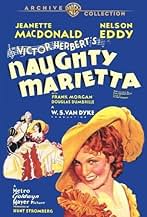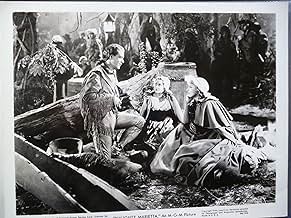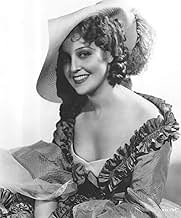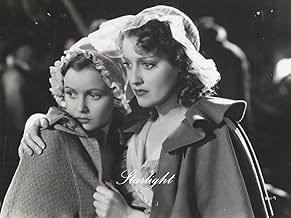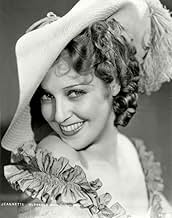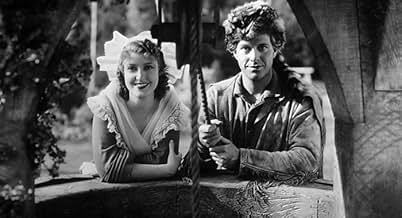NOTE IMDb
6,5/10
1,7 k
MA NOTE
Une princesse s'enfuit d'un mariage arrangé. Elle navigue vers la Nouvelle-Orléans et est sauvée des pirates.Une princesse s'enfuit d'un mariage arrangé. Elle navigue vers la Nouvelle-Orléans et est sauvée des pirates.Une princesse s'enfuit d'un mariage arrangé. Elle navigue vers la Nouvelle-Orléans et est sauvée des pirates.
- Réalisation
- Scénario
- Casting principal
- Récompensé par 1 Oscar
- 5 victoires et 1 nomination au total
Douglass Dumbrille
- Uncle
- (as Douglas Dumbrille)
Joseph Cawthorn
- Herr Schuman
- (as Joseph Cawthorne)
Jane Barnes
- Casquette Girl
- (non crédité)
Arthur Belasco
- Mercenary Scout
- (non crédité)
Margaret Bloodgood
- Heavy Casquette Girl
- (non crédité)
Alexander Bokefi
- Singer 'Ship Ahoy'
- (non crédité)
Ed Brady
- Mercenary Scout
- (non crédité)
Ralph Brooks
- Suitor
- (non crédité)
Avis à la une
Only a few of the other comments mention the dialogue of this movie, which I think is superb! The verbal sparring between Marietta and Captain Warrington is a delightful contrast to their soul-mated singing and elevates this film above other musicals of the era. One always suspends disbelief when viewing any film, of any era (come on, you don't think modern films are really "real", do you?), and it may be difficult for some to enter into the mindset of a '30s moviegoer, but with not too much effort even those who say they don't like this type of film, or these actors, or whatever, can find something to enjoy in this film. (Just call it a fantasy, without special effects.) Some of the opening scenes are almost embarrassingly silly, but quite soon the movie hits its stride and the music, humor, and sweep of the story carry you along. As an untrained actor in his first real role (singing cameos don't count), Nelson Eddy does quite well, thank you; I am inclined to think that the oft-repeated comment about his "wooden" acting style may owe more to L. B. Mayer's jealousy (remember what he did to John Gilbert?) than to a true assessment of his skill (which, admittedly, did improve over time). Mayer wanted MacDonald for himself and the obvious attraction between Eddy and MacDonald, coupled with her stinging rebuffs of Mayer's advances, made him no good friend of "the baritone". (Bear in mind, too, that Eddy was not interested in being an actor; he used film to advance his concert career.) I think this is a grand film, almost my favorite of the duos' work. "Maytime" has an edge because I had the good fortune to see it on the big screen when it was re-released in 1962, and I've only seen the others on television. The music in "New Moon" is glorious, and Nelson and Jeanette seem to be having such fun together in "Sweethearts".... All I can say is, if you have the opportunity to see MacDonald/Eddy films on the big screen at a film festival or revival theatre, don't pass it by!
Naughty Marietta has earned it place in film history for being the first film to pair the singing duo of Nelson Eddy and Jeanette MacDonald, but it's also a fine example of its particular genre.
A typical variant on the boy-meets-girl theme, this film has a French princess running away from the court of Versailles to the newly- colonized Louisiana, where she meets and falls in love with a mercenary soldier who sings as well he fights. There is an excellent supporting cast including Frank Morgan and Elsa Lanchester, but it is above all a vehicle for the singing talent of Eddy and MacDonald. The script is amusing and at times quite sophisticated and the pair handle it well (MacDonald is a bit ahead of Eddy here, but he makes up for that with his glorious baritone voice). The final duet, Ah Sweet Mystery of Life is one of the great vocal duets in cinema musical history, and only slightly less orgasmic than the "Czaritza" duet in Maytime.
Obviously a vehicle for fans of the Singing Sweethearts, but the film's production values are good, and it should be interesting viewing for any student of cinema's Golden Age.
A typical variant on the boy-meets-girl theme, this film has a French princess running away from the court of Versailles to the newly- colonized Louisiana, where she meets and falls in love with a mercenary soldier who sings as well he fights. There is an excellent supporting cast including Frank Morgan and Elsa Lanchester, but it is above all a vehicle for the singing talent of Eddy and MacDonald. The script is amusing and at times quite sophisticated and the pair handle it well (MacDonald is a bit ahead of Eddy here, but he makes up for that with his glorious baritone voice). The final duet, Ah Sweet Mystery of Life is one of the great vocal duets in cinema musical history, and only slightly less orgasmic than the "Czaritza" duet in Maytime.
Obviously a vehicle for fans of the Singing Sweethearts, but the film's production values are good, and it should be interesting viewing for any student of cinema's Golden Age.
Naughty Marietta marked the first teaming of Jeanette MacDonald and Nelson Eddy and what a success it was. MacDonald had broken into films with Paramount pictures which made her a star. She moved to MGM the previous year and had done a fourth film with Maurice Chevalier which was well received. But she and Chevalier did not get along and she wanted no more films with him. She did one with Ramon Novarro and there was no great demand for that team.
Louis B. Mayer decided to team her with operatic baritone Nelson Eddy. Eddy had been signed by MGM and had done what we would now call cameo parts in three films. He even gave Eddy co-star billing in this first featured role.
The results were a box office smash. Jeanette and Nelson looked great on the screen and sang even better. Seven more films followed that paired them. Even today they still have a loyal fan base.
Naughty Marietta had its debut on Broadway in 1910 with music by Victor Herbert and book and lyrics by Rida Johnson Young. It was one of Herbert's biggest hits and the songs are still popular today. Back then the melody was king and what melodies they were.
Of course the book has to be taken with a grain of salt and allowances for the mores of the times. The operetta is set in the New Orleans of Louis XV. One of his royal wards has been promised to wed a Spanish nobleman and she wants none of it. The royal lady exchanges places with her maid who is going to New Orleans as a promised bride for one of the French colonists.
When they're almost there, the ship is attacked by pirates and the promised brides among them Jeanette MacDonald are taken ashore. But they are rescued by an intrepid band of frontiersman led by Nelson Eddy who sing even better than they fight. They're mercenaries in the service of the Territorial Governor of Louisiana.
As Jeanette put it in the beginning of the film, she wants to marry for love and she couldn't love any of those powderpuff courtiers that inhabit Versailles.
Watching my VHS of Naughty Marietta today it was interesting to see a portrayal of New Orleans society in 1765 and then seeing New Orleans try to dry out from another hurricane. New Orleans was and is one valuable piece of real estate on this continent, located at the mouth of the Mississippi-Missouri-Ohio river systems. It changed hands until many times until the Louisiana Purchase got it for the USA.
Nelson and Jeanette have a rough go of it as they always do in their films. But a few songs and love conquers all.
Being this was their first film, Jeanette and Nelson got to sing their first duet which was Ah Sweet Mystery of Life. A really fabulous melody and lyric from a golden age of song writing. One of the great love songs ever written. Naughty Marietta should be seen for that alone.
Louis B. Mayer decided to team her with operatic baritone Nelson Eddy. Eddy had been signed by MGM and had done what we would now call cameo parts in three films. He even gave Eddy co-star billing in this first featured role.
The results were a box office smash. Jeanette and Nelson looked great on the screen and sang even better. Seven more films followed that paired them. Even today they still have a loyal fan base.
Naughty Marietta had its debut on Broadway in 1910 with music by Victor Herbert and book and lyrics by Rida Johnson Young. It was one of Herbert's biggest hits and the songs are still popular today. Back then the melody was king and what melodies they were.
Of course the book has to be taken with a grain of salt and allowances for the mores of the times. The operetta is set in the New Orleans of Louis XV. One of his royal wards has been promised to wed a Spanish nobleman and she wants none of it. The royal lady exchanges places with her maid who is going to New Orleans as a promised bride for one of the French colonists.
When they're almost there, the ship is attacked by pirates and the promised brides among them Jeanette MacDonald are taken ashore. But they are rescued by an intrepid band of frontiersman led by Nelson Eddy who sing even better than they fight. They're mercenaries in the service of the Territorial Governor of Louisiana.
As Jeanette put it in the beginning of the film, she wants to marry for love and she couldn't love any of those powderpuff courtiers that inhabit Versailles.
Watching my VHS of Naughty Marietta today it was interesting to see a portrayal of New Orleans society in 1765 and then seeing New Orleans try to dry out from another hurricane. New Orleans was and is one valuable piece of real estate on this continent, located at the mouth of the Mississippi-Missouri-Ohio river systems. It changed hands until many times until the Louisiana Purchase got it for the USA.
Nelson and Jeanette have a rough go of it as they always do in their films. But a few songs and love conquers all.
Being this was their first film, Jeanette and Nelson got to sing their first duet which was Ah Sweet Mystery of Life. A really fabulous melody and lyric from a golden age of song writing. One of the great love songs ever written. Naughty Marietta should be seen for that alone.
This is truly one of my favorite classics. My grandmother gave it to me when I was five, after she saw my interest in and love of opera and musicals. It is light and romantic with some absolutely lovely duets between McDonald and Eddy. Though not as passionate and dark like the more modern musicals, it is quite charming and worth seeing.
I wish that "Naughty Marietta" and "Sweethearts" and "I Married an Angel" and " and "Maytime" and would be gathered in a 4 disc Tribute set of DVD's. MacDonald and Eddy were well aware that the music in their films was mostly tripe and that the plot lines were thin at best.They were keenly aware of their film's theatricality being in a style that was already passé. But if you watch their faces when they act, ( and it is very good acting!) and see the mutual admiration in their eyes, and understand that it is all performed with tongue in cheek, the films become a lasting delight. My favorites are "Marietta," "Sweethearts" and "Maytime."
"Marietta" is the height of charm. MacDonald is perfection with her bird like trills and rolling "r"s, and shows a very wide display of emotions, including everything from dramatic hand wringing and tears to delightful comedic acting and humor. Eddy matches these moods with considerable skill. He had to be somewhat less flamboyant than MacDonald in order to keep t the movie plausible. The real villain is the plot, but even that could not take away the delight this picture gives to me. ( Frank Morgan is great in it!)
" Sweethearts" is my very favorite of their films. The antiquated plot of the musical stage play was tossed, and a whole new modern story was written for it by Dorothy Parker. Only the songs from the operetta were kept, and were interwoven into the movie within "Great Ziegfeld " like elaborate settings. It was also the first full length 3 strip Technicolor movie made at MGM. Both stars looked wonderful in color, and the absolutely rip roaringly funny story line only pauses for the musical numbers . The songs were acted and sung with such obvious self depreciating humor, that I cannot stop smiling , even now as I am writing this.
"Maytime" is, of course a tragedy, with lovely haunting songs and great scenic beauty. The made for the screen "Opera within the operetta" is the two star's acting zenith. Their delight and passion and friendship for each other in real life shines through the scene, giving it an extraordinary sense of truth. SO, Why not a glorious Boxed set from SONY/ TURNER/ MGM? Please??????
"Marietta" is the height of charm. MacDonald is perfection with her bird like trills and rolling "r"s, and shows a very wide display of emotions, including everything from dramatic hand wringing and tears to delightful comedic acting and humor. Eddy matches these moods with considerable skill. He had to be somewhat less flamboyant than MacDonald in order to keep t the movie plausible. The real villain is the plot, but even that could not take away the delight this picture gives to me. ( Frank Morgan is great in it!)
" Sweethearts" is my very favorite of their films. The antiquated plot of the musical stage play was tossed, and a whole new modern story was written for it by Dorothy Parker. Only the songs from the operetta were kept, and were interwoven into the movie within "Great Ziegfeld " like elaborate settings. It was also the first full length 3 strip Technicolor movie made at MGM. Both stars looked wonderful in color, and the absolutely rip roaringly funny story line only pauses for the musical numbers . The songs were acted and sung with such obvious self depreciating humor, that I cannot stop smiling , even now as I am writing this.
"Maytime" is, of course a tragedy, with lovely haunting songs and great scenic beauty. The made for the screen "Opera within the operetta" is the two star's acting zenith. Their delight and passion and friendship for each other in real life shines through the scene, giving it an extraordinary sense of truth. SO, Why not a glorious Boxed set from SONY/ TURNER/ MGM? Please??????
Le saviez-vous
- AnecdotesMuch to Frank Morgan's annoyance, he was required to shave his mustache, which he hadn't done for 17 years.
- GaffesThe 17th Century French nuns have plucked eyebrows and wear make-up and lipstick.
- Citations
Warrington: Now let's talk this over as one mudlark to another...
Marietta: I do not wish to be included in that.
Warrington: ...but that was no street singers' warbling, Blue Eyes. The quality of those tones was something...
Marietta: I used to appear at the Opera Comique.
Warrington: I see, until the manager wished for you to appear as Lady Godiva and you refused.
Marietta: Yes, something like that, yes.
- ConnexionsFeatured in Some of the Best (1944)
- Bandes originalesChansonette
(1910) (uncredited)
Music by Victor Herbert
Lyrics by Rida Johnson Young
Additional lyrics by Gus Kahn (1935)
Sung by Jeanette MacDonald and chorus
Meilleurs choix
Connectez-vous pour évaluer et suivre la liste de favoris afin de recevoir des recommandations personnalisées
- How long is Naughty Marietta?Alimenté par Alexa
Détails
- Durée
- 1h 45min(105 min)
- Couleur
- Rapport de forme
- 1.37 : 1
Contribuer à cette page
Suggérer une modification ou ajouter du contenu manquant

